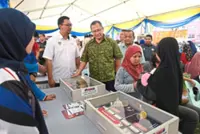SINGLE-use plastics is making a comeback at restaurants and even food courts managed by local councils.
While it is common to see food served on polystyrene plates, drinks come in single-use plastic cups with straws. Plastic forks and spoons are provided with meals, too.





